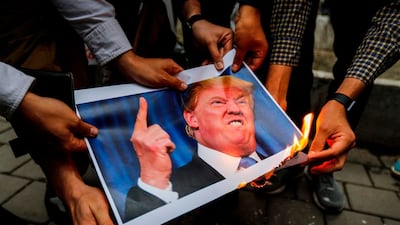US President Donald Trump’s unflinching determination to withdraw from the Joint Comprehensive Plan of Action (JCPOA) has stunned many who jumped to invest in the emerging market in the last three years.
State Department briefings after Mr Trump’s statement late yesterday said that sanctions would be re-imposed in two phases, one lasting 90 days, the other three months. That means that countries and businesses will have to decide quickly whether they are with Mr Trump, or with Tehran.
Indeed, the ink on Mr Trump’s executive order was barely dry when new ambassador to Germany, Richard Grenell tweeted a warning that “German companies doing business in Iran should wind down operations immediately”.
Economic rewards for Iran’s agreement to halt production of weapons-grade atomic material is a key pillar of the 2015 nuclear deal. If European states are unable to promote business links with Iran, Tehran would regard the lack of follow through as a violation of those undertakings. The restraints on its nuclear activity and the inspections by teams from the International Atomic Energy Agency that supervises compliance would quickly collapse.
Writing on Wednesday Emil Dall, a research fellow at RUSI , noted that many businesses remain fearful of the reach of US sanctions. “Many European businesses will be motivated primarily to comply with US sanctions requirements for fear of losing access to US markets or receiving heavy fines from US sanctions enforcement agencies.”
While the fear of heavy sanctions does persist, whether or not the US will be able to reinstate a watertight level of sanctions without European and Asian cooperation is uncertain. Indeed there are already signs that some countries may seek sanctions waivers, and continue to deal with Tehran.
Leading this charge was French Foreign Minister Bruno Le Maire who suggested he would seek “exemptions” and “grand-fathering measures” in discussions with US officials later this week. He added: “[The US Withdrawal] is going to cause considerable economic difficulties, but beyond those economic problems, it’s a matter of principle, to have extraterritorial sanctions”.
_________
Read more
Does deal exit mean Trump is eyeing regime change in Iran?
Iran nuclear deal: a thought-out strategy is still lacking
_________
French aircraft manufacturer Airbus, who currently are yet to deliver some 97 planes as part of a multi-billion-dollar deal, announced they were” carefully analysing” the situation, while it was confirmed that US manufacturer Boeing’s license to export almost $20 billion worth of aircraft to Iran’s ageing fleet would be revoked.
Iranian oil has found a thirsty market in Asia, with China, India and Japan quickly becoming some of Tehran’s top customers since sanctions were lifted.
Ehsan Khoman, head of MENA research at Bank of Tokyo-Mitsubishi, told The National that this trade may not necessarily be devastated by the new sanctions.
Mr Khoman said: “The US is expected to go it alone in relation to the resumption of Iranian sanctions and thus, the EU may not deem it necessary to reinstate sanctions on shipping insurance, which were critical in disrupting Iranian crude exports between 2012-16.”
Although there would be some hit, it is not likely to come close to pre-2016 levels. “In terms of the precise size and magnitude of Iranian crude that is likely to be impacted, we foresee that it would not likely be the near one million b/d of lost supply seen over 2012-2016 during the wave of nuclear related sanctions in place on Iran, but more in the region of 250,00-350,00 b/d”.
He added there are already signs, that Asian economies will seek waivers from the sanctions. “Comments overnight from Japanese Director of Petroleum Policy at the Ministry of Economy, Trade and Industry, Takashi Yamada, were that the Japanese government is seeking an exemption from US sanctions on its imports. It is entirely possible that others could follow suit”.
“Whilst the unilateral US reimposition on Iranian crude will reduce its exports, the size and scope still hinges on Iran’s importing countries’ adherence to conform with the sanctions” he added.
Andreas Schweitzer, managing director of Arjan Capital, an advisory firm for business looking to enter the Iranian market said he expected European governments to stand up to the US in defence of their businesses.
“A lot of big companies invested big money in that market based on sovereign promises, today they will question if promises are not worth the paper they are written on," Mr Schweitzer said.
“I would strongly expect European governments to protect the investments of their tax paying individuals and corporations they have encouraged to go to Iran.
Mr Schweitzer added that the collapse of the deal did not necessarily spell the end for those looking to do business with Tehran.
“Those who don’t have the stamina won’t stay, Iran is a big boy’s game for those who have nerves money and time, for them Iran is still a great market, they will keep it on their radar.”


